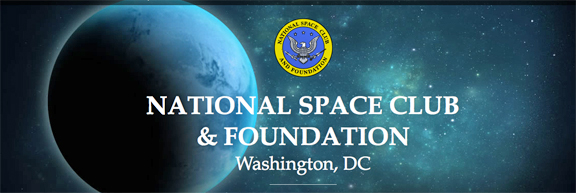[Satnews] The National Space Club & Foundation has announced their Annual Award recipients.
The Awards are selected by panels of experts from across the aerospace and defense industry, government and academia, and are a testament to the inspiring work of individuals across the United States. The Awards will be presented at the 59th Annual Robert H. Goddard Memorial Dinner, taking place at the Washington Hilton Hotel on Friday, March 11, 2016.
The recipients are:
- The New Horizons Team will receive the Club's preeminent award, the Dr. Robert H. Goddard Memorial Trophy. The New Horizons mission is honored for helping us understand worlds at the edge of our solar system by making the first reconnaissance of the Pluto system, and by venturing deeper into the distant, mysterious Kuiper Belt - a relic of solar system formation. New Horizons launched on January 19, 2006; the spacecraft swung past Jupiter for a gravity boost and scientific studies in February 2007, and conducted a six-month-long reconnaissance flyby study of Pluto and its moons in summer 2015, culminating with Pluto closest approach on July 14, 2015. As part of an extended mission, pending NASA approval, the spacecraft is expected to head farther into the Kuiper Belt to examine an ancient building block of small planets like Pluto on January 1, 2019, more than a billion miles beyond Pluto.
- Dr. Stewart Cameron, Director, Survivability Assurance Office, National Reconnaissance Office, will receive the Dr. Joseph V. Charyk Award. Dr. Cameron developed an analytically-based, architectural-level resiliency strategy for the National Reconnaissance Office responsive to, and effective against, the full range of current and projected threats. He has since been instrumental in gaining complete support for that strategy through the Department of Defense, the Intelligence Community, the Office of Management and Budget, and the United States Congress.
- The Dawn Project Team will receive the Nelson B. Jackson Award. In March 2015, Dawn became the first mission to reach a Dwarf Planet when it captured orbit around Ceres, the largest unexplored world between the Sun and Pluto. The first spacecraft to orbit a body in the main asteroid belt, Dawn also is the first to orbit two solar system destinations (Vesta and Ceres) making it the first truly interplanetary spaceship.
- Warren Ferster, Editor, Space News, will be recognized with the Press Award for informing a global audience with timely and knowledgeable news and opinion on the most important trends and events impacting the people who defend freedom, push the limits of technology, and explore the universe. As a reporter he covered every aspect of commercial, government, and military space activity. As the newspaper's primary editorial writer for more than a decade, he has been an important voice in shaping policy and chronicling the contributions of the space industry to science, defense, and the global economy.
- Mark Geyer, Deputy Director, NASA Johnson Space Center, will receive the Astronautics Engineer Award for his many accomplishments throughout a distinguished career in aerospace and systems engineering and particularly for his leadership in the development and successful flight test of the Orion Multi-Purpose Crew Vehicle (MPCV) which moves NASA closer to the goal of human exploration beyond low Earth orbit.
- The Orion EFT-1 Team will be recognized with the Eagle Manned Mission Award for the extraordinarily successful execution of the Orion Experimental Flight Test-1, paving the way for the development of the first new American crew vehicle in over forty years.
- Dr. John Reager, Research Scientist, Jet Propulsion Laboratory, will receive the NOAA - David Johnson Award for using the Gravity Recovery and Climate Experiment (GRACE) time-variable gravimetric data to estimate the potential for catastrophic flooding.
- Dr. Kerry Joels, Principal, Total Learning Research Institute, will receive the Space Educator Award. Dr. Joels is recognized for his work in inspiring and educating teachers and students in space science through leadership and creative direction of national programs for NASA, the National Air and Space Museum, the White House, the Challenger Center, SPACE EXPLORERS and MARS CITY.
- Emma Louden, student, Park City High School, is the winner of the Olin Teague Memorial Scholarship. Ms. Louden is recognized for determining the orbital elements for the Near Earth Asteroid 1999 JD6, and the classification of NEA 1999 JD6 as a Potentially Hazardous Asteroid as well as the tracking of their positions and the prediction of potential catastrophic impacts with the Earth well in advance so plans can be made to protect life on Earth. The orbit determination was achieved by analyzing three images collected at Etscorn Observatory in Socorro, New Mexico during separate observations. The celestial coordinates were then used in the Method of Gauss to obtain the asteroid-sun vector and subsequently the six orbital elements of the asteroid's path.
Individuals and organizations interested in attending the 59th Annual Robert H. Goddard Memorial Dinner on Friday, March 11, 2016 at the Washington Hilton, may find more information on our website http://www.spaceclub.org.


